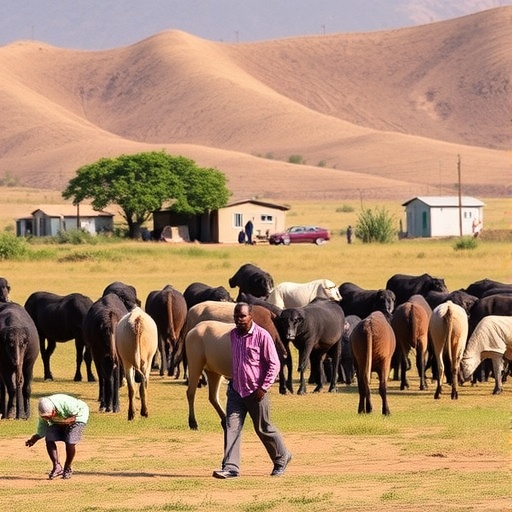The intricate web of rural poverty in Southern Ethiopia, particularly within the Gamo Zone, has recently captured the attention of researchers due to its persistent and multifaceted nature. A noteworthy study conducted by Melkamu examines the depth and dynamics of rural poverty in this region, where agricultural activities dominate the socio-economic landscape. The research reveals not only the extent of poverty but also important metrics regarding the average exit time from such dire conditions, shedding light on the challenging journey many households face.
In recent decades, Southern Ethiopia has witnessed a complex interplay of factors contributing to rural poverty. These factors span from climate variability, which directly impacts agricultural yields, to socio-political dimensions that affect access to resources and opportunities. Melkamu’s study offers an essential framework for understanding how these elements converge, creating a precarious existence for rural households striving to break free from the cycle of poverty.
Analyzing poverty in the Gamo Zone is particularly crucial due to the region’s unique socio-economic fabric. The Gamo people, known for their rich cultural heritage and agricultural practices, face stark economic challenges exacerbated by limited access to markets, education, and healthcare. The study highlights how these barriers not only trap individuals in poverty but also hinder community-level development, thus perpetuating a cycle of underdevelopment.
One of the primary aims of Melkamu’s research is to quantify the average exit time for households experiencing rural poverty in this area. By employing a robust methodological approach, the study isolates various variables that influence the duration of poverty spells. Understanding how long it typically takes for families to escape poverty is crucial for policymakers and development practitioners. This insight can inform targeted interventions and resource allocation aimed at accelerating poverty alleviation efforts.
The methodology adopted in this research involves a comprehensive data collection process, employing both qualitative and quantitative techniques. Surveys and interviews conducted within the Gamo Zone provide a nuanced understanding of the lived experiences of individuals facing poverty. This dual approach allows for richer data, combining statistical analysis with personal narratives that paint a vivid picture of hardship and resilience in the face of adversity.
In the process of analyzing the data, Melkamu uncovers key patterns that reveal the underlying causes of prolonged poverty. The study indicates that access to education significantly correlates with improved household outcomes. Families with higher educational attainment demonstrate a greater capacity to adapt to economic shocks and utilize available resources effectively. Consequently, the findings underscore the urgent need for educational initiatives that aim to empower rural populations, enabling them to break free from cyclical poverty.
An equally important focus of the study is the impact of community resources on poverty alleviation. Melkamu explores how cooperative societies and community groups can provide essential support systems for rural households. These collective efforts not only enhance resource sharing and risk management but also foster a sense of belonging and collective resilience among community members. The results suggest that strengthening such social networks could be instrumental in reducing poverty rates in the Gamo Zone.
Climate change poses another critical challenge that exacerbates rural poverty in Southern Ethiopia. The research indicates that irregular rainfall patterns and extreme weather events have increasingly disrupted agricultural productivity, leading to food insecurity. As agricultural dependency remains high in the region, the findings call for urgent climate adaptation strategies tailored to the needs of rural farmers. Such strategies could enhance resilience against climatic shocks and improve food security in vulnerable communities.
Furthermore, the study emphasizes the need for government and non-governmental organizations to adopt a multi-faceted approach when addressing rural poverty. Policies that aim for immediate relief must also incorporate long-term strategies for economic diversification, infrastructure development, and enhanced access to healthcare services. By addressing these interconnected areas, stakeholders can create a more sustainable pathway towards poverty alleviation.
One of the most striking conclusions drawn from Melkamu’s research is the recognition of agency among individuals living in poverty. While systemic challenges undoubtedly affect their lives, the study highlights instances of innovation and resilience, showcasing how people craft strategies to cope with adversity. This empowerment perspective is vital, as it calls for a narrative shift that recognizes the strengths and potentials of those affected by poverty rather than portraying them solely as victims of circumstance.
As this research finds its way into public discourse, it raises essential questions about the effectiveness of existing poverty alleviation strategies and the need for meaningful engagement with the communities affected. Policymakers are urged to listen to the voices of the poor and involve them in decision-making processes that directly impact their lives. This participatory approach is critical to ensuring that interventions are relevant and effective.
In conclusion, Melkamu’s study on rural poverty in the Gamo Zone of Southern Ethiopia serves as a clarion call for urgent action and deeper understanding. By illuminating the complex realities faced by rural households, the research emphasizes the need for comprehensive solutions that address the root causes of poverty. With the right strategies and collaborative efforts, there lies a significant opportunity to transform the lives of those trapped in poverty, enabling them to build a brighter future for themselves and their communities.
As the conversation around rural poverty continues to evolve, it is vital to remember that sustainable development is not just about economic growth; it is about fostering environments where all individuals have the opportunity and resources to thrive.
Subject of Research: Rural Poverty in the Gamo Zone of Southern Ethiopia
Article Title: The Extent of Rural Poverty and Its Average Exit Time in the Gamo Zone of Southern Ethiopia
Article References:
Melkamu, M. The extent of rural poverty and its average exit time in the gamo zone of Southern Ethiopia.
Discov glob soc 3, 146 (2025). https://doi.org/10.1007/s44282-025-00296-0
Image Credits: AI Generated
DOI: https://doi.org/10.1007/s44282-025-00296-0
Keywords: Rural Poverty, Southern Ethiopia, Gamo Zone, Economic Development, Climate Change, Education, Community Resilience, Poverty Alleviation.




